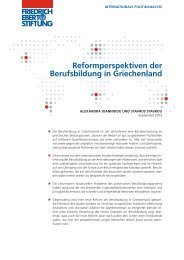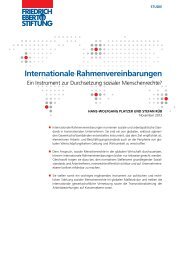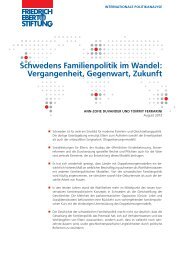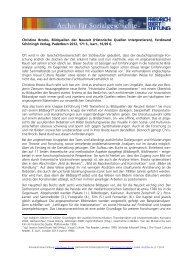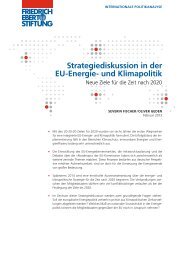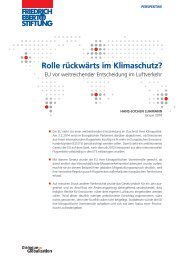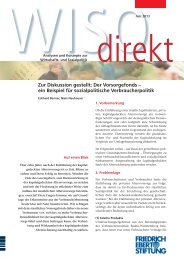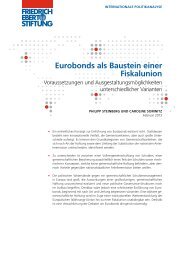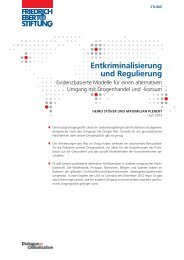Women - men - gender. - Bibliothek der Friedrich-Ebert-Stiftung
Women - men - gender. - Bibliothek der Friedrich-Ebert-Stiftung
Women - men - gender. - Bibliothek der Friedrich-Ebert-Stiftung
You also want an ePaper? Increase the reach of your titles
YUMPU automatically turns print PDFs into web optimized ePapers that Google loves.
24 TAGESSPIEGEL 15 OCTOBER 2008<br />
Emma’s bickering and squabbling<br />
Daughters<br />
The “Alpha-Girls” want a Career and Fun.<br />
But a new Feminism is confronted by much<br />
greater Challenges<br />
SABINE HARK<br />
[Newspaper Photo: My stomach belongs to me: The struggle<br />
against Paragraph 218 became a mass move<strong>men</strong>t (here<br />
1983 in Karlsruhe)]<br />
The “old” feminism is dead. At any rate, the features<br />
section of German newspapers would prefer it to be<br />
that way. The period of the <strong>men</strong> haters, who never outgrew<br />
their dungarees and who had settled into their<br />
role of victim, is over – that is the tenor of these papers.<br />
There is often a resonance of anti-wo<strong>men</strong> homophobia<br />
in such articles. On the other hand, the very same journalists<br />
benevolently view the emergence of a “new<br />
feminism”, un<strong>der</strong> which they include a series of younger<br />
German wo<strong>men</strong> authors, such as, Jana Hensel, Elisabeth<br />
Raether (“Neue deutsche Mädchen” [new German<br />
Girls]), Meredith Haaf, Susanne Klingner, and Barbara<br />
Streidl (“ Wir Alphamädchen” [We Alpha-Girls]), Charlotte<br />
Roche (“Feuchtgebiete” [Wet Zones]) or Thea<br />
Dorn (“ Die neue F-Klasse [The new F-Class]).<br />
The new “F-Class” is engaged in distancing itself<br />
from the image of the “Emmas” and their apparent<br />
self-pity. The “new feminism” projects itself as strong,<br />
career-oriented and fun-loving, prepared to prove that<br />
“any woman, who is dynamic, disciplined, self-confi -<br />
dent and courageous can be an achiever in a society<br />
like ours” as Thea Dorn put it. This mind-set is very different<br />
from that of the “old feminism”. The F-Class<br />
wo<strong>men</strong> do not want to be bothered with discriminatory<br />
structures. They perceive their success as proof of<br />
their personal ability and their individual superiority in<br />
the daily struggle for survival, and not as the outcome<br />
of social conditions. This provides the link between<br />
“new feminism” and neo-liberalism and patriarchal<br />
discourses.<br />
The attempt to declare feminism dead is as old as<br />
feminism itself. It is also tradition to generate distorted<br />
images of the feminist move<strong>men</strong>t as is being done by<br />
features writers and the F-Class wo<strong>men</strong> in the current<br />
debate. However, a “new feminism” cannot emerge<br />
from their critique of “old feminism”. It is rather a sectional<br />
feminism, because justice, according to it, is not<br />
a larger social issue, instead it is viewed in terms of access<br />
of a few to the echelons of the elite. Therefore, this<br />
brand of feminism has practically nothing to say to the<br />
present time.<br />
Indeed, it is high time to now start thinking of a<br />
new feminism. It’s main motif is freedom, and its roots<br />
are in the new wo<strong>men</strong>’s move<strong>men</strong>t that began in the<br />
second half of the 20th century.<br />
The desire for autonomy and self-determination<br />
mobilized wo<strong>men</strong> across the world at that time. In this<br />
connection, feminists, from the very beginning, did<br />
not think in terms of the individual but rather in terms<br />
of the social and historical context. <strong>Wo<strong>men</strong></strong> are not free<br />
because of a dense and coercive straitjacket of stereotypes<br />
of femininity and also due to a partially violent<br />
sexual culture, which denies wo<strong>men</strong> their freedom,<br />
and above all the <strong>gen<strong>der</strong></strong> hierarchical social organization<br />
of production and reproduction is responsible for<br />
the banish<strong>men</strong>t of wo<strong>men</strong> into the “private sphere”.<br />
In her now famous and notorious speech on behalf<br />
of the “Action Committee for the Liberation of<br />
<strong>Wo<strong>men</strong></strong>” on the 13 September 1968 at the Delegates<br />
Conference of the SDS (German Socialist Students Fe<strong>der</strong>ation)<br />
in Frankfurt am Main, Heike San<strong>der</strong>s expressed<br />
it thus: <strong>Wo<strong>men</strong></strong> “continue to be raised for the private<br />
sphere, for the family, which in turn is shaped by the<br />
conditions for production, which we are fi ghting<br />
against. Growing up with stereotypes, an inculcated<br />
feeling of inferiority, the contradiction between their<br />
own expectations and the demands of society results in<br />
having a perpetual bad conscience at not having done<br />
justice to the demands made on them or in having to<br />
make a choice that would always mean the renunciation<br />
of vital needs.”<br />
This discontent with the straitjacket of feminity is<br />
not confi ned to the West and evidence of this is the<br />
bestseller by Maxie Wan<strong>der</strong>s, “Guten Morgen du





